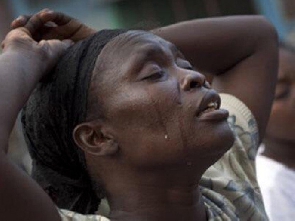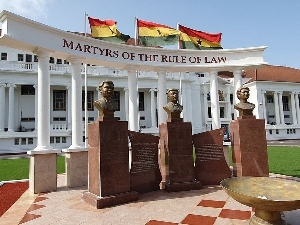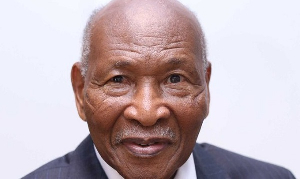Opinions of Monday, 15 May 2023
Columnist: Isabella Agyakwa
Expanding the frontiers of ‘See Something, Say Something’
Love, they say, is a beautiful thing. However, if your spouse is to be a thorn in your flesh, then it is better to cut that part of you off, as expressed in the Holy Scriptures, for your sanity.
Although the issue of divorce in this part of our world (Africa) is seen to be an abominable act, especially for a Christian country like Ghana, the narrative ought to be changed.
Of the few ladies or gentlemen that have successfully gone through divorce procedures, only a few of them are bold enough and alive to tell their stories while a fraction of that population is keeping that part of their lives to themselves in order not to be tagged or stigmatised by society, including the church.
For some unfortunate souls like Eunice, Gifty, Agyei, Francis and others whose stories have not been reported in the media, may their souls rest in peace.
Scenarios
As reported in the media recently, 25-year-old Eunice was hacked with a cutlass during a scuffle with her husband. Eunice had moved out of the house allegedly due to the constant emotional and physical abuse by her husband. Eunice’s father described his son-in-law as a serial wife-beater, a habit that forced his daughter to move out of the house.
In March 2023, the Nkawkaw Magistrate Court remanded into prison custody a 71-year-old visually-impaired man for allegedly beheading his wife after she threatened to divorce him. Prior to the despicable act, reports say George, who engaged in a heated confrontation with his wife, accused her of being ungrateful after she threatened to divorce him.
Another murder incident reported involved a woman who allegedly poured salt-laced boiling water on her husband at Accra Newtown, leading to his death a few days later in February 2022. The incident, which shocked residents of the neighbourhood where the incident occurred, triggered gossip regarding what actually happened, given that the couple had been in matrimony for the past fifteen years, albeit with intermittent quarrels.
Concluding on the scenarios, a 33-year-old lady was nabbed in 2015 by the police for stabbing her spouse over a banku and tilapia meal, a wonderful and sumptuous Ghanaian delicacy. An eyewitness said that the man lost his job and could not cater for the family and three other children.
Argument
One cannot tell what runs through the minds of the attackers, or even tell what triggers their emotions to the point of brutality to the level of murder or manslaughter. No matter what the excuse is, thou shall not kill is still the law anywhere on planet Earth.
This is where the proverbial Ghanaian hospitality and being a neighbour’s keeper comes into play. As we may appreciate, for the act to take place, it would have been preceded by a heated argument (in most cases) which would have attracted the attention of their neighbours who can play a major role in saving a life, if they are apprised of the situation.
Recently, the Ministry of National Security launched “See Something, Say Something”, a citizens' awareness campaign aimed at protecting the country against terrorist attacks.
The campaign encourages the public to be vigilant of the activities of suspicious characters and report such activities and characters to security agencies.
As part of the campaign, a toll-free number, 999, has been provided for citizens to swiftly report suspicious activities to state security authorities or use the emergency contacts and social media platforms of the Ghana Police Service to draw the attention of state agencies to unusual activities within their communities.
Where mobile connectivity is a challenge, locals are to report suspicious activities to their local police, traditional leaders, opinion leaders, heads of faith-based organisations and leaders of political parties who could expedite action to arrest any threat of terrorism attack situation.
To put an end to these avoidable incidents, where innocent people are killed by close relations, including their spouses, culminating in jail sentences and leaving their kids behind, the Domestic Violence and Victim Support Unit (DOVVSU), a unit in the Ghana Police Service responsible for addressing matters of domestic abuse against women and children, and other relevant institutions must critically think about liaising with the national security to extend the “See Something, Say Something” campaign to address domestic abuse in households.
What the proposed campaign, in my opinion, should also address is to encourage the public to look beyond targeting strange or unfamiliar faces. That also implies encouraging neighbours to be each other's keeper and report any case of domestic abuse against any gender, including children.
Unfortunately, whenever the issue of domestic abuse is mentioned, it is the women who are quick to speak up about being victims, when in some instances men equally go through worst-case scenarios emotionally or physically.
This is due to the notion that men are stronger than their female counterparts and because society, especially in Africa, has placed men on a certain pedestal. It is also because the male specie is unable to report it for fear of being tagged weak, feeble, or incompetent enough to handle a female.
Already, DOVVSU is expected to, among its numerous functions, provide free services to members of the public, protect the rights of the vulnerable against all forms of abuse be it physical, sexual, emotional/psychological, socio-economic, or harmful cultural practices.
In addition, it is to provide advice on crime prevention at homes, in schools, churches and markets as well as refer victims for medical services and specialized help to clinical psychologists.
Notwithstanding all these, the impact of the unit is yet to be fully met so working with the national security can help DOVVSU perform better.
Priority
In order not to interfere with the work of national security, a separate toll-free number can be created for the public to swiftly report cases of abuse or use the emergency contacts of the Ghana Police Service to draw the attention of the state agencies.
This is where an appeal will be made to the public not to trivialise the situation by making prank calls to the unit. We must learn to stop such an attitude because it does not lead to a better Ghana.
While working with national security, DOVVSU should also engage the services of academia, psychologists, legal practitioners, and other relevant institutions to research success stories of other countries such as Sweden, Denmark, and the Netherlands to enable Ghana to develop its own, unique structures for managing the situation.
One may argue that the unit is working with basic guidelines in the existing Domestic Violence Act, 2007 (Act 732), but findings from the proposed new research can help produce solutions to bridging gaps identified with legislation in managing cases in which victims of domestic violence will need in moving forward in life and incorporated in the Act.
Other suggestion that may help the situation is the deliberate attempt by DOVVSU in collaboration with national security ministry to establish hubs in schools, market places, and local communities in the country.
The hubs should be situated in districts with the highest recorded cases of domestic abuse. For instance, in schools, there should be engagements with children from domestic violent homes.
These hubs may help Ghana generate the necessary database about domestic violent households in Ghana, and also check the impact of policy interventions on the matter.
Although much efforts have been made to nib the situation in the bud, more has to be done and extending the see something, say something campaign can be a direction to be considered.













